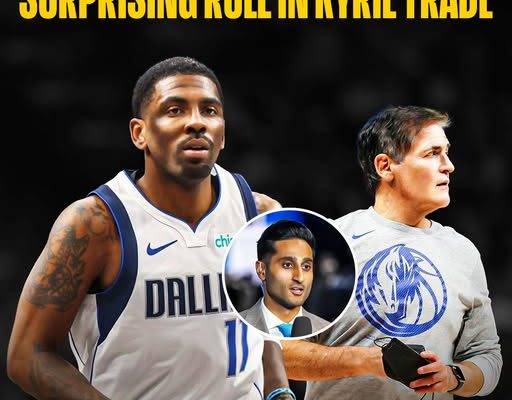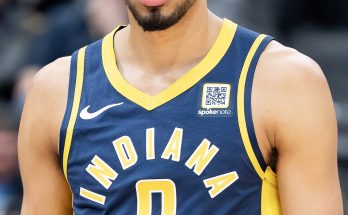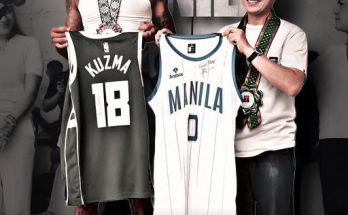When it comes to NBA ownership and the delicate dance between media figures, front office executives, and star players, few stories illustrate the complexity quite like Mark Cuban’s recent revelation regarding Shams Charania’s involvement in the Dallas Mavericks’ blockbuster trade for Kyrie Irving. For years, fans and analysts have viewed trades as the product of conversations between general managers, agents, and occasionally owners. But Cuban’s comments offered a surprising twist to that narrative, shining a light on how influential certain journalists have become, not only in shaping public perception but in helping facilitate real transactions at the highest levels of the sport. In Cuban’s telling, Charania, one of the most recognizable insiders in the basketball world, was not just a messenger reporting the details of the Irving deal but played a more direct role in helping the Mavericks execute the move that brought the eight-time All-Star point guard to Dallas.
This revelation caught many by surprise because it blurred the lines between journalism and front-office decision-making. Shams Charania, best known as an NBA newsbreaker for outlets like The Athletic and Stadium, has built his reputation by reporting on player movement, signings, and trades with remarkable speed and accuracy. His work, much like that of his counterpart Adrian Wojnarowski, has become a cornerstone of how fans and insiders consume breaking NBA news. But the idea that Charania may have been a participant in helping guide a monumental trade between two franchises introduces a new dimension to the influence wielded by modern insiders. For Cuban, a man who has never shied away from controversy or blunt honesty, his acknowledgment of Charania’s involvement was both surprising and revelatory, raising questions about how deals are shaped in today’s NBA landscape.
The Kyrie Irving trade itself was already one of the most significant moves in recent Mavericks history. Dallas was desperate to find a co-star to pair with Luka Dončić, the generational talent they had built their franchise around. Irving, whose tenure with the Brooklyn Nets was marred by controversy, inconsistent availability, and off-court headlines, became available after another breakdown in negotiations with Brooklyn’s management. Teams like the Los Angeles Lakers, Phoenix Suns, and Miami Heat were rumored to be in the running, but the Mavericks ultimately pulled the trigger, offering Spencer Dinwiddie, Dorian Finney-Smith, and draft compensation to the Nets in exchange for Irving. At the time, many were left wondering how Dallas positioned itself to outbid other suitors and secure Irving’s services. Cuban’s recent remarks suggest that behind-the-scenes relationships, including the surprising involvement of a journalist like Charania, may have played a bigger role than anyone realized.
From a broader perspective, Cuban’s revelation is a commentary on the interconnected nature of today’s NBA ecosystem. Insiders like Shams Charania and Adrian Wojnarowski are not just reporters but information brokers who maintain close ties with agents, players, and executives. These relationships allow them to break news before anyone else, but as Cuban’s comments suggest, they may also place these reporters in positions to help facilitate dialogue between parties. Charania’s deep connections with agencies such as Klutch Sports, which represents Irving, likely gave him a vantage point that few outsiders could match. If he helped bridge communication or smooth over concerns between Irving’s camp and the Mavericks’ front office, it would make sense why Cuban would view his role as pivotal.
Still, the idea of a journalist directly influencing a trade raises ethical questions. Traditionally, reporters are expected to observe and document events, not participate in shaping them. But the NBA is a league driven by relationships, and insiders like Charania are deeply embedded in its social and business fabric. Cuban’s acknowledgment may not be so much an indictment as it is a reflection of how blurred the lines have become between media and management. In an era where information flows at the speed of Twitter updates and player empowerment drives roster moves, insiders who command trust on multiple sides of negotiations hold immense soft power.
Cuban himself has always been an unconventional owner. Since purchasing the Mavericks in 2000, he has transformed the franchise into a model of innovation, from technology in the locker room to player-friendly operations. He has never hesitated to speak candidly about league operations, referees, or business dealings, sometimes at the cost of hefty fines. His openness about Charania’s involvement in the Irving trade is consistent with this pattern, pulling back the curtain on how NBA business actually gets done. For fans, Cuban’s comment offered a rare glimpse into a process that is usually shrouded in secrecy. For those within the league, it likely confirmed suspicions about the increasingly hybrid roles certain figures play in the NBA ecosystem.
The Mavericks’ gamble on Kyrie Irving has been one of the defining storylines of their recent seasons. At the time of the trade, many questioned whether pairing Dončić with Irving would work. Both are ball-dominant guards, and Irving’s off-court unpredictability made him a risky acquisition. But Cuban and the Mavericks believed that talent wins in the NBA, and the chance to acquire a superstar-caliber player was too valuable to pass up. If Charania helped facilitate or reassure the Mavericks in making that move, then his role might have been far more consequential than simply reporting “Kyrie Irving has been traded to Dallas.” It would mean he was part of the fabric that made the deal happen.
The impact of this revelation also extends to how fans and analysts will view future reporting from Charania. Does his involvement in trades compromise his objectivity? Or does it simply underscore the reality that insiders are power brokers, not just journalists? For Cuban, it seemed more like an acknowledgment of how much trust players and executives place in Charania. In a high-stakes environment where millions of dollars and careers are on the line, having a respected intermediary could prove invaluable. In that sense, Cuban’s comments are not a criticism but a recognition of how much Charania has embedded himself in the NBA’s inner workings.
For Irving himself, the trade to Dallas marked another chapter in a career defined by both brilliance and turbulence. His tenure with the Mavericks has had ups and downs, but the deal itself showed the league once again that teams are willing to take risks when it comes to acquiring elite talent. That Cuban would pull back the curtain years later and reveal that a journalist had a hand in the move only adds to the lore of how Irving has shaped and reshaped rosters across the NBA. From Cleveland to Boston to Brooklyn and now Dallas, Irving has consistently been at the center of drama, and his moves often reflect larger truths about how the modern NBA functions.



